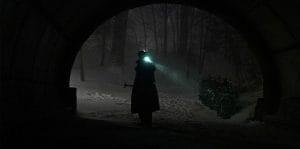
Other Madnesses isn’t a period piece, exactly, but the New York City it depicts – a grim urban hellscape where gentrification and renewal seemingly haven’t happened – is a reminder of earlier, darker times and certainly, earlier, darker movies.
The pervasive, oppressive atmosphere that’s so powerfully conjured throughout writer/director Jeremy Carr’s debut feature recalls the distinctly New York grit and grime of early Abel Ferrara, the Cinema of Transgression’s drug-addled Super-8 freak-outs, and, of course, the granddaddy of them all, Martin Scorsese’s Taxi Driver. That Other Madnesses is also a kind of vigilante story might, at first blush, make one think that it will be entirely of a piece with those arthouse/grindhouse hybrids that cinematically immortalized the seedy underbelly of a city gone to rot.
Carr’s film, however, isn’t a pastiche and isn’t simply out to pay tribute to perceived influences. Instead, it’s an alternately shocking and sympathetic take on that material that manages to carve out a unique space all its own. In large part, that’s due to the film’s protagonist, Ed Zimmer (James Moles), a middle-aged Brooklynite who spends his days hosting a bus tour of NYC landmarks and his nights brooding in his dingy tenement apartment. Ed is something of a loner, for sure, but less unhinged than he is unsatisfied; he’s well-read and mostly well-adjusted but still largely miserable, trapped in a city that seems not to care much about him or anyone else. He’s a complex character portrayed with real skill and dynamism – Moles is in just about every scene, and is terrific – and, even as his life takes a turn for the twisted, Ed somehow never loses the audience’s sympathy.

“…largely miserable, trapped in a city that seems not to care much about him…”
The story hinges on a series of prophetic nightmares that plague Ed’s sleeping hours, which involve flashes of what appears to be a horrific child kidnapping. These sequences are awash in disturbing, arresting imagery – bare light bulbs in dingy basements, menacing shadows in deserted alleys, half-glimpsed acts of violence – and Ed is understandably shaken when they begin to infiltrate his waking life in various ways. Even as he begins a tentative romance with Lucya (Natia Dune), a young immigrant tour-bus passenger who might represent the best hope of releasing Ed from his increasingly traumatized mental state, the nightmares don’t go away. And when he happens upon evidence that the horrors from his dreams might be real (and happening just a short ferry ride away from his home borough), Ed is pushed to act on the brutal thoughts he’s been suppressing about ridding the city of crime.
The psychic-dreams angle is a conceptual hook that successfully separates Other Madnesses from by-the-numbers vigilante dramas, but that’s far from the only element that makes it stand out. Overall, the deliberately paced and contemplative film is a lot more interested in its main character’s inner workings than it is in chronicling the effects of his one-man war on evildoers – a supernaturally tinged Death Wish this isn’t. The depictions of violence aren’t plentiful, but they’re viscerally powerful – a confrontation involving a broken mirror is jaw-dropping in its brutality – and they effectively punctuate the quieter moments in which Ed tries to hold on to his life and sanity in the wake of his gruesome foreknowledge and compulsion toward revenge.
The positive effect of Moles’ performance in the lead role can’t be overstated; this character could have easily come off as a narcissistic creep (think Travis Bickle), but he and Carr pull off the formidable challenge of never crossing that line with him. Whether Ed is cheerily rattling off facts about the Chrysler Building to gawking tourists, reading Russian literature to an escort he hired or canvassing the home of a suspected murderer, there’s a genuineness and empathy to him that makes even his most abhorrent choices seem almost reasonable. That this tour de force portrayal is the actor’s first credited feature film role makes the result all the more impressive.

“…the well-wrought characterizations and the story’s intriguing ambiguities keep things compelling…”
Yes, Carr’s screenplay does occasionally lean a bit overwritten – the references to Dostoevsky and Poe are solid thematic underpinning if a little on-the-nose – but the well-wrought characterizations and the story’s intriguing ambiguities keep things compelling throughout. The film’s grainy, grunge-noir cinematography (also credited to multi-hyphenate Carr) is another major asset, an aesthetic choice that further serves the seedy, dread-filled mood that rarely lets up throughout.
Other Madnesses would be worth a look for either its lead performance or its nigh-apocalyptic view of New York alone, but together – and coupled with evocative choices in everything from supporting cast to sound design – these elements bring it pretty close to the level of a must-see. Indie cinema is littered with films that reflect disturbed, pessimistic worldviews and philosophizing on humanity’s violent nature, but they’re rarely this assured or fully realized. This is a bracing, powerful statement from its maker and star, and while their work perhaps might’ve played even better in a shabby Times Square movie house circa 1982, the film is bound to leave an impression anywhere it can be seen.

Other Madnesses (2015). Written and directed by Jeremy Carr. Starring James Moles, Natia Dune, Ilya Slovesnik, Andrew William Smith, Toshiko Oizawa, William Bill Farrow.
4 ½ stars out of 5

